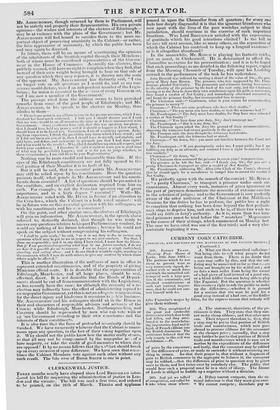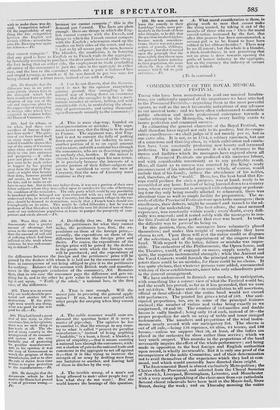CURRENT CORN CATECHISM.
[oarcis.u, AND FOUNDED ON TIIE. MATERIALS OF TilE PASSING MOMENZ.]
(Continued.)
201. RIBBON TRADE. Molting Post. House of Lords. lSth June Ital.— The petitions which he was about to present were so very numerously signed, de- scribed with so much force and truth the unmerited suf- ferings of such a large por- tion of the community, and involved considerations of such vast rational import- ance, that he could not con- tent himself with &c. A. What are their unmerited sufferings ? Not being able to sell what people do not want from them. There is no doubt that a man may suffer by this, and that the suf- fering may be unmerited so far as that ans being not brought on by his wilful act ; and so does a man suffer from being the owner of a bad piece of land instead of a good one, or a blind fiddler from not being able to play like Paganini. But the question is whether this creates a right to rob the public to make up the difference,—whether it is ground for a motion that the man be paid for a good crop instead of a bad one, or the fiddler take Paganini's wages by force, for the express reason that nobody will give them without.
legal, of French !Mons into
the lutist dominions. The 202. They complained of A. The statement, therefore, of the pe- the great and intolerable titioners is this. They state that they can- d ist ress him which that trade not make cheap ribbons, and that other men had fallen, and they attn. can. Their request therefore is, first, that buted it to time overwhelm- a stop may be put to that portion of British ing imortation, legal and il- tr.a. trade and manufactures, which now goes
abroad toprocure ribbons for the consumer
petitioners believed that the at the cheaper price ; secondly, that a stop only remedy to this evil was may further be put to that portion of British trade and manufactures which is now set in motion by the expenditure of the difference of price by the consumer; and lastly, that the consumer may be robbed of the difference of price, or made to surrender it without receiving any thing in return. So that their prayer is, that without a fragment of gain to British commerce in the aggregate to balance it, the consumer may be robbed,—that the difference of price in question may be given once to them, and lost twice over by somebody else. The public that would bear such a proposal must be in a state of idiocy. The House of Lords is obliged to huddle up a negative without a division.
203. And yet we talked A. If they cannot compete, then time ra- of competition, and called for tional inference is that they must give over. bricks when straw where- " We cannot compete ; therefore pay us with to make them was de- nied. Competition indeed ! Of the impossibility of any thing like fair competition between the English and French ribbon - unumfaetu- rers, Dr. Bowling was again his witiless. — I b.
204. Ile thought that the difference was in no point inure plainly shown than in the disregard which had been manifested towards the adoption of any one of the safe and ingenious plans for the styli' ession of smuggling in foreign silks which were suggested in evidence before the House of Commons.- I b. A. Can he not discern, that the Govern- ment is met by the opinion everywhere gaining ground, that smuggling is the !rotund way of letting down an enormous wrong ; that the smuggler is in filet a meri- torious member of society, toiling, and with considerable risk, in neutralizing the absurs dity of governments, and saving thousands upon thousands annually to the'community ?
A. This is mere clap-trap, founded on misrepresentation or mistake. The argu- ment never was, that the thing is to do good to France. The argument was, that Eng- land is not to commit the folly of putting down one portion of her industry to serve another portion of it to an equal amount and no more, and with a national loss through the consumers, who are as deserving people as anybody else, besides. If the mover is sincere, he is answered upon his own terms. It is precisely because the interests of a greater portion of their fellow-subjects are not to be sacrificed to serve the men of Coventry, that the men of Coventry must continue as they are.
206. Were they able to demonstrate that a greater amount of advantage had arisen to the empire at large than the amount of evil and of suffering which had been inflicted on the trade whose existence he was endeavour- ing to defend ?-1b. A. Decidedly they are. By ceasing to
pay the petitioners for what they cannot make, the petitioners lose, first, the ex-
penditure on them of the foreign price,—
secondly, the expenditure on them of the difference between the foreign price and
theirs. Per contra, the expenditure of the
foreign price will be gained by the dealers in the goods with which the foreign ware
will be purchased; and the expenditure of the difference between the foreign and the petitioners' price will be gained by the dealers with whom it is laid out by the consumer of rib- bons in consequence of not being obliged to give it to the petitioners for nothing. Balance of the account with British trade and manufac- tures in the aggregate (exclusive of the consumer), Nil. Remains then, that in one case the consumer pays the difference and gets no- thing for it, and in the other he gets value in whatever he chooses to lay it out upon. " Tuttle of the whole," a national loss, in the first case, of the difference.
207. There was no reason why one trade:should be pro- tected and another left to destruction. If the prin- ciple were worth any thing, what was good for one was good for all.—Ib. A. That is sure enough. Will the mover join in procuring the general appli- cation ? If not, he must not quarrel with other people for creeping when they cannot walk.
208. They had beard a great deal of free trade in other countries, but, in his opinion, there was no such thing as free trade at all. The ob- ject of every country in the arrangement of its commer- cial system was the very laudable one of protecting its peculiar manufactures; and, in his opinion, it was the duty of Government to watch the progress of those manufactures, and so to alter the rate of duties front time to time as togive protection to the manufacturers.—lb.
209. He thought that the documents which he had read to the House had proved a ease of grievous wrong.— It. A. The noble reasoner would soon un- derstand the question better if it were a matter of pipe-clay. The opinion he has to combat is, that the attempt in any coun- try to what is culled " protect its peculiar manufactures," instead of being anything " laudable," is a hoax, a fraud, a blunder, a piece of stupidity ;—that it means courting a national loss through the consumers, with- out a shadow of gain to the national trade and commerce in the aggregate to set off against it;—that it is like trying to increase the strength of an army by drafting men from one battalion to another, and leaving half of them in ditches by the way.
A. The terrible wrong, of a man's not being allowed to make other people buy of him what they do not want ! But the world knows the bearings of this question.
210. He was content to leave the remedy in their Lordships' hands, more par- ticularly in the hands of those who thought, as he did. that the question involved higher, because moral, considera- tions ; that it was not a nett matter of pounds, shillings, and pence ; but that it turned upon the principle that the more widely they threw open the paths of honest industry to their population, the inure effeetu illy tiny closed the avenues which led to guilt and criree.-•lb.
A. What moral consideration is there, in giving work to men that cannot make the thing wanted, by taking it out of the mouths of those who can? Or is the moral consideration increased by the fart, that after this process has been consummated, a servant girl is to be found to have been robbed in her ribbons besides ? There may be no ill-intent ; but the whole is a blunder, a thick-headedness, in not perceiving that not an atom is done towards opening the paths of honest industry in the aggregate, but on the contrary the industry of servant girls is robbed.
(To be continued.)























 Previous page
Previous page